Eye movement during sleep. Mufti Fahretdinov and the integration of Muslims in Russian society
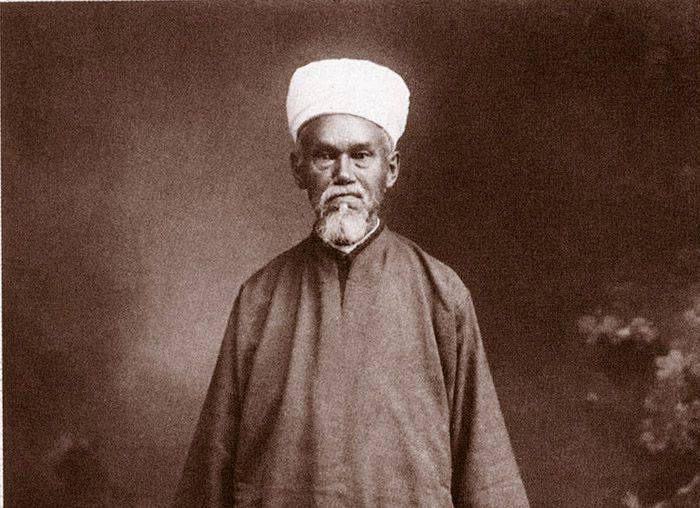
Mufti of the Russian Empire ... On the pages of "Military Review" we have already told about some of them ("The moon is cold to the touch", "As General Igelstrom and Military Intelligence Officer Huseinov ..."). Among the muftis there were people of various virtues. But none, in my opinion, on scholarship and moral qualities can not be compared with Rizaitdin Fakhretdinov. Orientalist, scholar and encyclopaedist, writer, playwright, enlightener and just a very conscientious person, extremely handsome ... Author of the multi-volume bibliographic monograph "Asar" about the work of cultural figures of Turkic and other Eastern peoples, a supporter of the emancipation of Eastern women, the mufti of the Central Spiritual Administration of Muslims of 1923 year by 1936, year of death. His destiny is an illustration of how, wandering in the dark, a man enters from a strictly regulated space into a world of big questions and meanings. The main factor of such a breakthrough becomes the introduction to the Russian language and Russian culture.
... The village on the banks of the river Kichu is closed by fields, and time here does not seem to move. There are mentions of a village in Stories Bulgaria - “Tavarikha Bulgaria”, a legend is known about the Muslim village of Shyrdan, from where he ran with his relatives, not wanting to be baptized, Babai Yuldash did not reach the place of the confluence of the Kichu and Banna rivers. The village of Yuldashevo, named after the founder, eventually began to be called Kichuchat or Kichuchatovo; “Kichu” means “ford”.
People here are busy with heavy, burdensome peasant labor, and questions about the structure of matter only go as far as thinking about the structure of the tree. Why is the bushing of the trolley wheel made of birch and not of oak? And so as not to split!
Events and changes in life occur somewhere beyond distant hills and do not fit the borders of the village. Here, people live without a railway, a locomotive, and electricity, but it turns out that without them they can plow the land, marry, raise children, grow old, and accompany each other to the cemetery. The story is motionless and closed.
On the day his son was born, Fahretdin Saifetdin was away. Returning, he called the baby Rizaitdin in memory of his son, who died two years before. Families of village imams are not rich; they are not customary to keep nursing or handmaidens to care for their children. Reese grew up under the supervision of her mother in breast milk. In the summer, the mother took the child with her for harvest and haymaking.
One of Rizaitdin’s first children's impressions is associated with haymaking on the Bath River. Adults were busy on the mowing, the boy alone went into the forest and got lost. For a long time he wandered between tall trees, finding no way. Not knowing which way to go, I crossed a deep ravine and stopped at a large stump. From all sides he heard the voices that called him, but stood silently with his eyes closed until he was found. It hit the memory - the feeling that you are alone in an unfamiliar place, people from far away call you, but you, immersed in your own world, do not respond ...
Memories do not roll out like wallpaper, they are randomly shreds. Here is another one. One winter morning, the boy came out into the threshing floor, where the grain was threshing. Scales and litter, separated from the grains, flew away toward the sun, rising above the hills. Whether blinded by his rays, Reese did not see how this rubbish fell on the ground, or it seemed to him that the scales from the grains were not attracted by the earth, but were carried away by the wind, but he asked his brother, who was twelve years older than him: “Where does the litter fly away?” He replied without hesitation: “To Makarievo”. These words have long settled in the children's memory. Even later, when Reese found out that the village of Makarievo is not a place of sunrise, but a big fair, when he realized that the litter was coming out of the ground and was returning to it, he continued to believe that Makarievo was somewhere far to the east, there, where the sun rise is born. Only by growing up and seeing on the map where the village is located, he got rid of the idea that the sun rises in Makarievo.
Why did not Reese ask his older brother what the place is - Makarievo, why is rubbish flying there? I myself did not know, besides, a habit had been formed since childhood - it is better not to ask anyone for an incomprehensible thing, it’s better for a long time, if to no avail, but to think for yourself. Reese sometimes suffered because he could not understand the essence of simple things, but he was not used to asking others for help ...
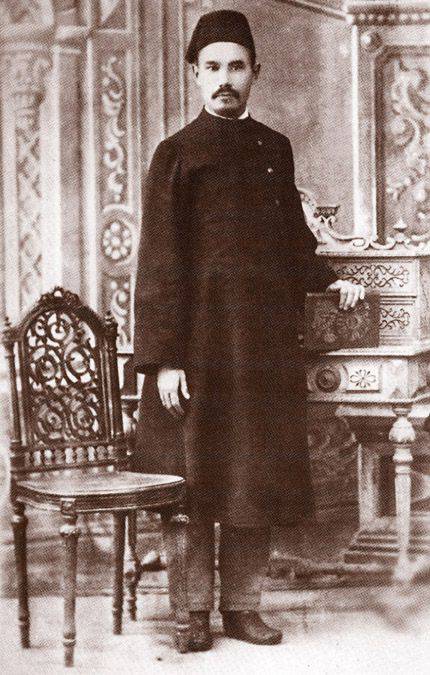
In the autumn of 1867, Reese, along with his uncle Gilman Karimi, went to the madrasah of the city of Chistopol. After studying the winter, he returned home and did not go to the madrasa the next year. When Rizaitdin talked about his youth and years of study, he always regretted that he could not finish his studies in the Chistopol madrasa, after which he could immediately enroll in a Russian school and then get an education in a Russian university.
In 1869, Riza, together with his brother Kashafetdin, was sent to the old-fashioned madrasah of the village of Lower Shelchely, which is twenty versts from Kichuchatovo. The first book he read was Fazilesh Shohur bound in gray canvas pasted onto cardboard, without the first page, with sheets burned with a splinter so that some words could not be disassembled.
Reza spent many months and years in the madrasah for the correspondence of books he remembered for life: “Bidan” rewrote three copies, “Sharha Gabdulla” - three, “Kavagiyd” and “Gavamil” - one by one, “Mansur Hashiyase”, “ Hayali Hashiyas "," Sadiyk "," Taglimel-mutagallim tariq-tagallim "," Mukaddimai Zhasaria ", comments by Khalid al-Azgari to" Mukaddimai Zhasaria "," Rajuzates-Suyuti "," Heinel-goylyyylymely, " - one copy each.
Sometimes, due to bad paper or damaged ink, the page had to be rewritten for a second and third time. Reese did not remember that someone at least once in all the years of his studies at the madrasa showed him how to write correctly, or corrected at least one of his letters. Rees recalled numerous mistakes in the books he had copied with shame ...
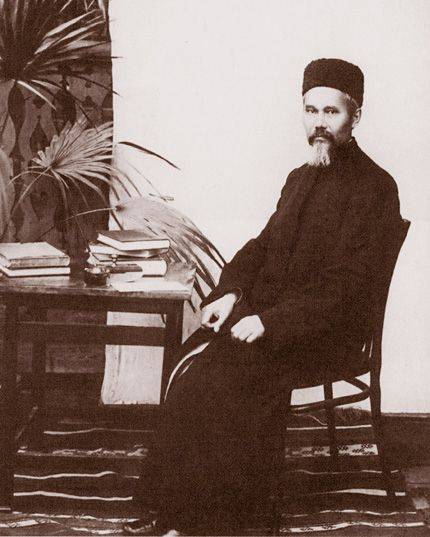
Once, a former shakird came to visit the madrasa, by then finished the Orenburg teacher's school and was going to teach Russian. Shakirdy at that time was reading an essay on natural science "Sharhe-mavakyyf" and, deciding to find out what the Russians think about the globe, asked the guest a question: "How do Russian scientists believe: is the Earth standing or is it constantly going down?" He replied: " The books I read say that the earth is moving east. ” After the departure of the guest, Reese and his friend Farid spent a long time looking for confirmation of these words in Sharhe-mavakyyf and in other books. They decided: "Either that master did not understand anything, or the Russians do not know anything."
Soon, Uncle Riza Gilman bought a geography textbook called "Nozhatel-Boldan." Reese brought the book to the madrasa, and his friend Farid took it to read. At night, when Reese was already going to bed, excited Farid shook Reese: “There is important news.” Reese lit the light.
- What happened, brother?
- The Earth, it turns out, is spinning, and the Sun is in one place. Well, how? Do you believe or not?
- kidding me, probably.
- No, here it is written in the book.
- In this? Maybe you misunderstood?
- Why, here. I reread several times. Here everything is proven, and I am fully confident in this.
After reading the book, Reese found out that the earth really revolves around the sun. The next day, the friends tried to tell the other shakirds about it, but they laughed at them: “If that were so, we would have to walk upside down like cockroaches on the ceiling. Why do we not fall down, and how the rivers and seas do not overflow? ”Reese decided not to argue, feeling that he does not yet have a reasoning.
"Nozhatel-boldan" he reread several more times. The book became a pretext for acquaintance with geography. In addition, the intention to learn Russian has become increasingly strong. Rizayitdin was more than twenty years old, but he could not even write his own address on the envelope. He talked about this with his father, but he warned: "I'm afraid the Russian language will spoil you." Reese did not go against his will, but, recalling this later, he said: "If a person does not know the official language of his state, he cannot even be considered full-fledged." He compared his life with the existence of a sleeping man who hears something through a dream, but he can neither comprehend anything nor undertake.
An attempt to learn the Russian language independently also ended in failure. Shakirdy madrasahs informed the mentor that Reza secretly reads a Russian textbook, Russian books and newspapers. He summoned Reese and reprimanded: “None of us knows Russian, but we live. Do not bother your head with unnecessary dreams. ”
He learned Russian much later, only in adulthood he was able to read the necessary scientific and historical literature.
In 1879, Riza decided to go to Astrakhan to see the famous madrasahs, get acquainted with new teaching methods and learn Russian. But the head of the Gabdelfattah-Khazrat madrasa said: “If Rizaitdin leaves for Astrakhan, he will not return back. If he wants to see other madrasas, let him go to Kizlau madrasa. ” He said this, knowing that the old-fashioned madrasah of the village of Kizlyau, known for its low level of teaching, would only disappoint Rizaitdina.
Before going to Bukhara, Rizaitdin decided to consult with his father, Fakhrutdin-hazrat. He embraced his son and cried: "If you go there, you will not be able to return soon and I will never see you." And from this trip Rizaitdin refused, so as not to offend his father. All these events he later called a series of missed opportunities ...
In the madrasa, Rizaitdin suffered from the impossibility of obtaining basic knowledge and compared his life with a sleepy kingdom. He was not familiar with arithmetic, and next to it there were neither textbooks nor people capable of explaining the simplest rules. He recalled how long he had been looking for at least some pamphlet, went to the fair for this, but found nothing useful. Only later was he able to accidentally buy a book called “Hisaplyk” - “Arithmetic”, written by Gabdelkayum-efendi. Catching up with this textbook every day, he studied the rules, and then he wrote a brochure for the shakirds of madrasahs and began giving free lessons in arithmetic to everyone.
In the spring of 1889, Rizaitdin bade farewell to a madrasah in which he spent exactly twenty years. He was then thirty-one years old. He left the madrasa with a feeling of bitterness: he had to collect knowledge, which he gained over the years, bit by bit. In the last year of study in the madrasa, he wrote the treatise “A gift for close friends” and a textbook on the Arabic grammar “Kitab at-tasrif”. A year later, Fakhretdinov’s books, Kitab al-Igtibar and the Introductory Book, were published in Kazan, explaining popularly the canons of religion concerning inheritance. In total, Fakhretdinov had published five books by that time.
These are modest brochures of gray-blue paper without a hard cover. But it was they who determined all his subsequent life.
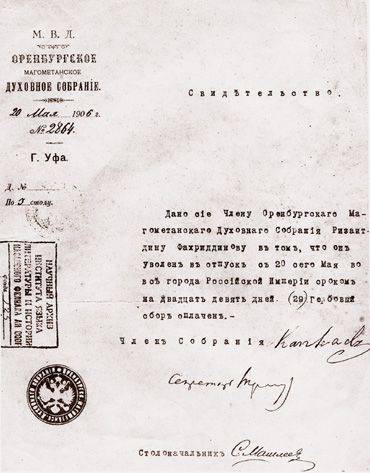
... It is said that the drama went from the holidays of Dionysus. Greek, it is possible, but in Ufa it is chilly for tunics, but they didn’t like near-Dionys. But who will deny that pure drama is present in the bazaars, where people from one cart overlap with another, that it occurs in hot table conversations in the restaurants and tea houses next to the Living Room? Art is always a little bazaar, there is a rustling crowd talk, mixed tribal rumble of a large area. The basis of it - the dialogue. Between the one and many, between the knowledgeable and the profane, between the talk and the opinion, between people of different cultures.
Fahretdinov is all in the Muslim tradition, all of it is directed into the Russian seething stream. The national theater has not yet been born, the dramaturgy is only being planned, but its voices are already audible in the interchange of meanings on which the Ufa kazy builds his prose. Who speaks in his books? Teachers, merchants, officials, clerics, the author himself. In his writings, people meet, talk about science, industry, education, art, argue among themselves, and in disputes reveal themselves. Such imaginary meetings and conversations between real characters are called Fahretdinov "Majlis". Majlis meetings are pictures, sketches, etudes from which adult theater grows.
Here, for example, the names of the fictional dialogues between real people - “Wildan and I”, “I and Gosman”, “Zakir and Shakir”, “Sagit, Suleiman, Salim”, “Hasan and Husain”, “Mulla Bikbulat and Gosman ". These mythical meetings take place in Ufa or Kazan, they talk about the advantages and disadvantages of religious and secular education, about gymnasiums and universities, about studying Russian culture. In some meetings of the Majlis, fragments of future plays are guessed. The dialogue scenes created by Fakhretdinov in the late nineteenth century, as it were, prepare the ground for the emergence of a national theater.
How did Fahretdinov appear in Ufa? How could a rural imam, who served less than two years in a village mosque, become an important employee of the Muslim Religious Board? What connections, intrigues and recommendations led to this?
There was no dating, no intrigue, no letters of recommendation. The order at that time in the printing houses was strict - each published book had its own obligatory copies, which were sent to the authorities. All five books by Fakhretdinov hit the table of the Ufa mufti Sultanov. After reading them, he said: "Find a learned imam and invite me." Of course, Rizaitdin did not imagine that he would be offered to become a Kazyim - a religious judge, an interpreter of laws, an arbitrator in disputes - in these positions are older people who have been wise by experience. But Mufti Sultanov is convinced: "Your knowledge, youth is very suitable for this position." And Fakhretdinov and his family moved to Ufa.
Under the direction of the Spiritual Administration of Muslims at that time there were more than four thousand parishes and as many mosques, three and a half million Muslims. The management accumulated papers, manuscripts, historical and biographical documents. Rizaitdin puts in order the soiled and inscribed papers, creates an archive and a library, and collects materials for his future fundamental works. He subjects the materials to careful systematization. “Having become a Kazyam, I started learning again almost from the alphabet,” he says about himself.
His favorite subjects are biographies of prominent Muslims of Russia and the history of Turkic peoples. In Ufa, he begins work on his most significant work - the Asar bibliographic collection based on documents. The name can be translated as "footprints" or "monuments", if broader - "footprints that gifted people leave in eternity." This multi-volume monograph, compiled in chronological order, is devoted to the life and work of cultural, educational and scientific people of the East. Fahretdinov has been working on this work for many decades.
"When he was engaged in scientific work, he spent many hours in the archive," recalled his daughter Asma. - He flipped through historical works, metric books, trying to find or check the dates he needed. He himself said, laughing: “If someone watches me from the side, he will say:“ What kind of wealth is looking for in the Riza archive, perhaps there is some treasure there, and he is trying to find it. ” However, for me to know the correct dates of birth and death of three or four scientists for the book “Asar” is more expensive than a bucket of gold. ”
The biographical information in Asar is interspersed with the author’s remarks and critical analysis concerning historical and theological issues. "Asaru" is close to the cycle of critical biographies of Fakhretdinov "Wonderful People", which tells about the leaders of Muslim science. There were published six parts of the cycle - Ibn Rushd, Magarri, Ibn Garabi, Ibn Teimiye, Imam Ghazali and an essay on the modern Fahretdinov scholar Ahmed Mithat. Rizaitdin writes biographies of remarkable women of the old and new Muslim world.
Less than ten years after arriving in Ufa, and Fakhretdinov amazes everyone with knowledge, education and erudition. There are no more learned people like him among Russian Muslims, only he speaks many languages and has a judgment on almost every fact of Muslim history and culture. In addition to Tatar and Russian, Riza not only speaks and writes Arabic, Turkish, and Farsi, but studies them and publishes scientific works. Chalfs, teachers, come to Fakhretdinov, and Fakhretdinov answers any question without preparation. Fahretdinov writes mainly in the language of the Turks. He is the author of the novels “Salim, or Chastity,” “Asma, or Offense and Punishment,” numerous articles about the Muslim tradition, its relationship to Russian and European science and education, about the emancipation of Eastern women and their inclusion in the Russian order of life.
The office of Fakhretdinov is on the second floor of the muftiat, facing west. On the contrary, the building of an Orthodox women's religious school, behind it is a tall house of the Ufa bishop; on the contrary, the Resurrection Cathedral, on the axis between the cathedral and Fakhretdinov's window is the home of the Ufa governor. Power, Orthodoxy and Islam - all against each other, all separately, but all together.
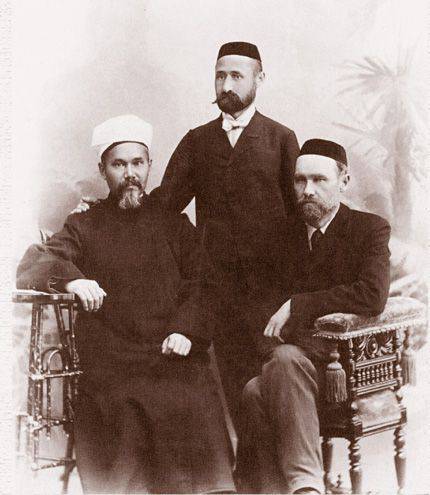
In the 1906, Fakhretdinov, at the invitation of the gold-miners Rameyev, moved to Orenburg, where he became the second editor of the Vakyt newspaper, Vremya, edited by writer Fatikh Karimov. Here, new facets of Fakhretdinov's personality are revealed - organizational skills and journalistic talent. Soon "Vakyt" becomes a popular Turkic edition. But the noisy, restless environment of newspapermen living with urgency and one day, a gray-haired and calm by nature scientist, “needed a quiet corner to surrender to more serious and creative work.” And then, especially for Fakhretdinov, the scientific journalism journal “Shura” is founded under the newspaper “Vakyt”, the editor of which he remains until the closing of the journal in January 1918.
During this period, Fakhretdinov wrote many biographical essays - portraits of scholars, poets, political figures, military leaders and even capitalists, figures of Western culture and various world religions. In almost every issue of the magazine “Shura” these biographies are published under the heading “Remarkable People and Great Events”. In the field of biographical research, Fakhretdinov is distinguished by a great rigor, a comprehensive and cold-blooded approach, when there is no room for categorical and sharp assessments.
From Orenburg to Ufa, Fakhretdinov returned in the 1918 year after the publication of the magazine was discontinued. He returns to work at the Muslim Spiritual Board and is again elected a religious judge. He is already known as a historian, journalist, and editor. As a man, he is balanced, tolerant, respects the thoughts of others. He has no fanaticism in matters of faith. Fakhretdinov is a supporter of balanced decisions, therefore in modern culture he is interested only in what is scientific and moral. The main work of Fakhretdinov in the field of theology is “Religious and social issues”.
Fakhretdinov has very serious intentions to completely devote himself to oriental studies. Corresponding proposals were received from academia, and they were almost accepted. But in 1921, Mufti Galimdzhan Barudi died, and in 1922, Fakhretdinov was elected Mufti of the Central Spiritual Board of the Muslims of Inner Russia and Siberia. The building of the Spiritual Administration becomes the place of its ministry until the last days of life.
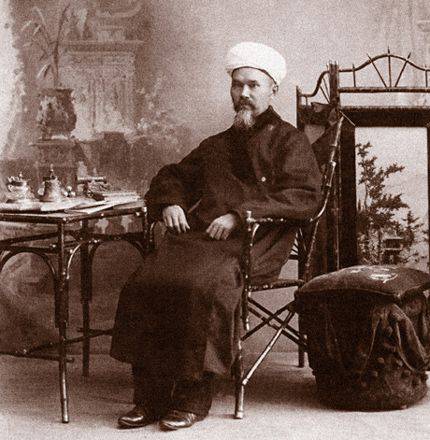
With the election of Fakhretdinov mufti, he petitions the People’s Commissariat for Nationalities Affairs to resume the publication of a religious journal. In 1924, Fahretdinov is seeking the publication of the “Islam Madzhallasy” - “The Journal of Islam”. It publishes articles by Fakhretdinov, Tardzhimanov, Kazyi, Jahangir Abyzgildin, Mukhlisa Bubinsky, theological writings, suras of the Koran, informational materials.
The authorities well understand that Fakhretdinov is not just a mufti, this is an orientalist of an encyclopaedic type, with weight both as a journalist and as a moral educator, and as the author of numerous works. Fakhretdinov - one of the main attractions of Ufa twenties. The popular “Guide to the Volga, Oka, Kama, Vyatka and White” 1925 of the year tells about the city as follows: “Ufa is a permanent stay of the administration of the republic. Bashkir folk poet Mazhit Gafuri and the historian Rizaitdin Fakhretdinov constantly live in Ufa. ”
One of the metropolitan scholars who visited the muftiate during these years, writes: “Fakhretdinov’s encyclopedic nature is clear - on his shelf there are about fifty books written by him, among them known to all Orientalists“ Asar ”, consisting of sixteen books, the series“ Famous People ”, a series of works on ethics, pedagogy, philosophy. Separately - filing journal articles from several hundred titles, other publications.
As a sign of respect for the scientific merit of Fakhretdinov in 1925, he was invited to Leningrad to celebrate the bicentennial of the Academy of Sciences. For seven long years after finishing work in the journal “Shura”, Rizaitdin was distant from the scientific community, and therefore he was especially pleased to have the opportunity to talk with serious scientists.
In Leningrad, he meets at the Academy of Sciences with academician Ignatiy Krachkovsky, a famous orientalist and translator of the Koran, talks with him in Arabic for a long time, and then meets scientists who came from Turkey, India, and Sweden. Fakhretdinov takes pride of place at the ceremonial meeting of the Academy; he also sees his books in the academic library. Together with the guests he visits the National Museum and the Hermitage, travels to Peterhof, where he enthusiastically inspects the imperial palace from the inside, because during his first visit here in 1888, he only had to look at the building from a distance. But the greatest impression on him was made by the library of the Academy of Sciences, a huge number of books stored here. In the academic library, Rizaitdin meets the historian Mikhail Khudyakov, who gives him his book.
Upon arrival home, sharing his impressions with loved ones, he says: "It is not surprising that the rulers of the people - the owners of these books - rule other nations as well." Asma Sharaf’s daughter Fakhretdinov recalled the words of her father: “If I had learned Russian in my youth, I could have read many books, I would have understood many sciences much earlier. I already then understood the need for the Russian language. Therefore, I gave all my children to the Russian school, I always wrote about the need to teach children the Russian language. ”
... In his old age, Fahretdinov got into the habit of coming to the Muslim cemetery on Sundays, where he wandered, looking at the inscriptions on the graves. In life, indicated the place where to bury him. From February 1936, Rizaitdin began to weaken and, according to his recollections, lost hope of recovery. He said: "Just do not bury me in the courtyard of the mosque next to the muftis."
One of the employees of the mufti was bequeathed: “When the time comes and I leave the world, my children will see death and become confused, not knowing what to do. Therefore, I entrust you with an honorable duty to bury me. You will do everything right and tell the children what to do. ”
He died in mid-April. He was buried in the previously indicated place. Over the grave they read the Koran. A lot of people came to accompany him, but the speeches dedicated to him were not said - according to the will, everyone disagreed in silence ...
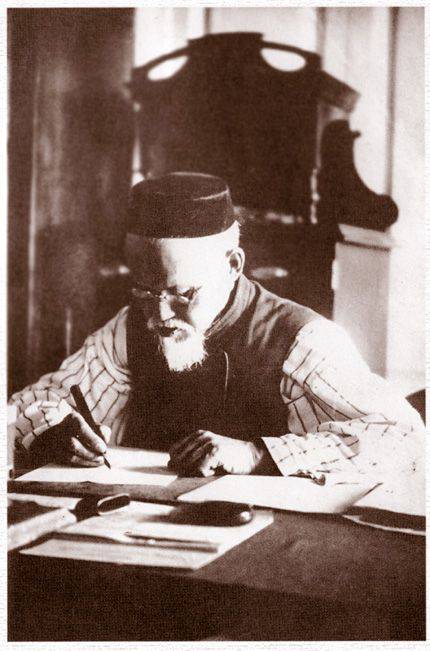
Yes, by scholarship, none of the muftis of the Russian Empire and the USSR is equal to Fakhretdinov ... And the current ones, what are they? A feature that catches the eye, even a steady trend, is a lapel from Russia, the Russian language and Russian culture and an orientation to the Middle East, to the countries of the Persian Gulf, where invitations, money, grants, etc. come from. Scholarship? Science? Well, this is not so many trouble themselves. More, so to speak, on the administrative and financial part. It is partly forgotten that the mufti is not a position, but a level of knowledge that allows to make fatwas - judgments on complex religious issues based on the Koran and Sunnah, that the degree of scholarship is not secondary. That is, with respect to the majority of modern Russian muftis, we can talk, in the language of stationery, about the “inconsistency of the position held”.
This is not just my personal observation. In Muslim communities, this is finally openly talked about. “Well, what am I the mufti ?! - Exclaims in conversation with the correspondent IslamReview Chairman of the Regional Spiritual Board of Muslims of the Kirov region Zufar-Khazrat Galiullin. - To be a mufti, you should ideally own at least seven religious sciences and be generally recognized by Muslim scholars ... You can’t choose a mufti! You can choose the chairman of the spiritual administration, the imam-muhtasib, but not the mufti. The mufti is not an elective office, but a degree of recognition, that is, other theologians recognize him as a mufti for his knowledge in the field of religious sciences. ”
I note that there are more muftis in modern Russia than in the rest of the world. It is difficult to say how much exactly, but even after the merger of a number of regional spiritual administrations, no less than eighty. However, from the point of view of high criteria for scholarship, there are very few muftis. If we talk about European Russia, we can say with confidence only one name - Sheikh-ul-Islam Talgat Tajuddin (Sheikh-ul-Islam - the highest theological title).
To this I will add that the situation when dozens of muftis and spiritual administrations are fighting for financial flows contradicts the very idea of creating an institution of muftis in the structure of the Russian government. Historically, it emerged as a tool for centralizing and strengthening statehood, a way to limit the influence of eastern countries (see "Crescent, tamga and cross").
Numerous muftis, leading the incessant struggle for finances and foreign grants, do not serve to centralize and strengthen the state. Some also manifest themselves as instruments of influence on Russian citizens by the hostile countries of Russia - the US satellites. That is the sad result.
Information